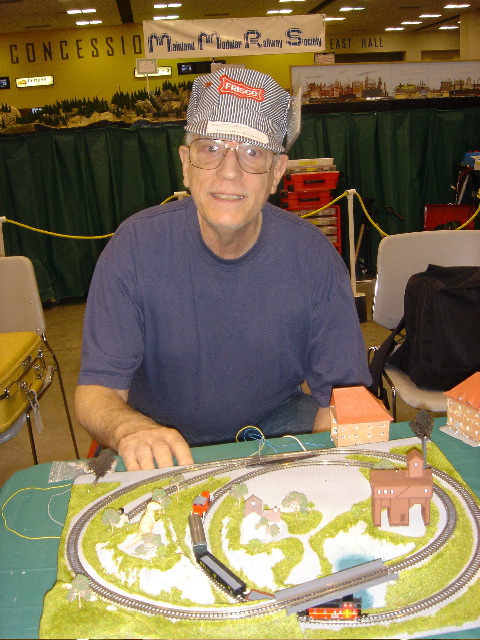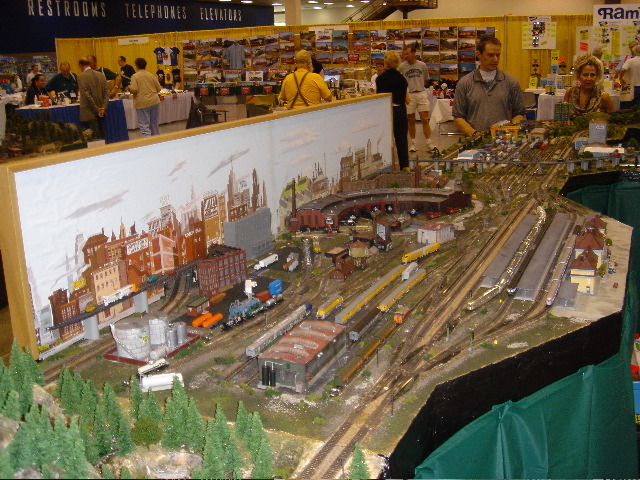With the July excitement well behind us, it's time for a final look back
at National Train Show from the perspective of us Northwest Pacific Z
Scalers.
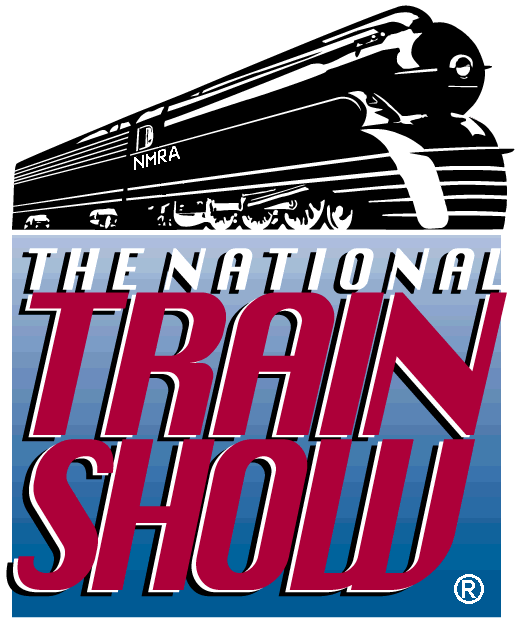
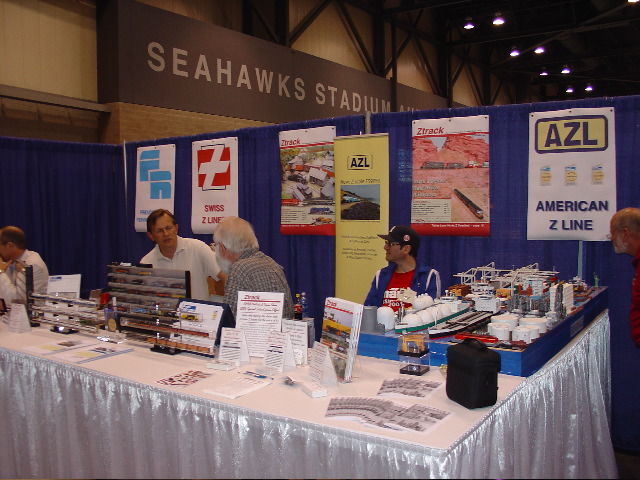
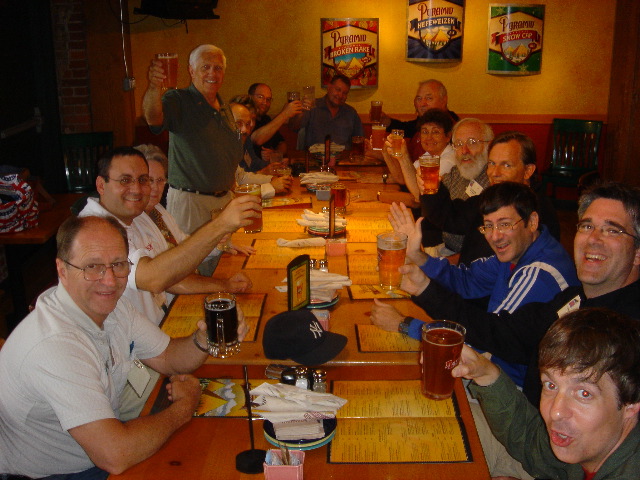
ROUND UP THE USUAL SUSPECTS
First of all, the National Train Show gave us Seattle locals a great
opportunity to meet fellow Z scalers from around the country and around the
world. Visitors included a few of the "movers and shakers" who have done so
much to promote our small scale, as well as provide us with new models and
technologies. Z scale railroading has inspired a remarkably tight-knit and
supportive online community, in which it's not unusual to strike up e-mail
friendships with commercial manufacturers or publishers as well as private
modelers. So it was wonderful to meet a number on on-line acquaintances
face-to-face for the first time.
Among our cast of characters were Rob Kluz of ZTrack Magazine, Hans
Riddervold of American Z Lines, Harald and Ilona Freudenreich of FR (Freudenreich
Feinwerktechnik), and James Shiff of SeaRails, to name just a few. Terry
Sutfin, longtime operator of the PoorVille and Debt City Railroad, was on
hand with his well-traveled portable layout, and David George represented
the Texas Z-scale community with his award-winning Golden-Blackhawk &
Central City modules. A motley crew of other Z modelers were on hand, as
you'll see below, and much time was spent browsing between Z exhibits,
swapping tips and stories as well as trackage rights on each other's
layouts.
One of the weekend's highlights was a big banquet on Saturday night,
featuring most of the weekend's Z scale exhibitors. (We may model small, but
we eat big!) We capped off an evening of toasts and photo-taking with a
group phone call to Jeffrey MacHan, who was unable to attend the show this
year. A resident of Montreal, Canada, Jeffrey has been perhaps the biggest
promoter of Z scale in North America over the past decade, especially in his
founding of the Z Scale online discussion group (groups.yahoo.com/group/z_scale).
BRING YOUR OWN Z
One of the exhibiting clubs cancelled before showtime, so the NTS
coordinators were able to offer us an "upgrade" from our originally assigned
spot to a much roomier piece of real estate right in the center of the
convention hall. This meant that we could run our Bring Your Own Z (BYOZ)
tables and our big modular layout right next to each other, with room to
spare for any other modules or Z displays that happened to show up.
We were able to set up about 15 feet of BYOZ tables along one side of our
new area. Here walk-in Z-ers could display small layouts up to about 2 by 4
feet in size. Jim Glass coordinated BYOZ activity, and as usual interacted
with visitors of all ages and sizes from behind his miniature pre-formed
Noch layout.
Mark Million arrived with a European-themed layout he's working on. This
included a loop of standard-guage track around the outside and a loop of
Zm-guage track on top. (Zm is one-meter narrow guage in Z scale, a
combination recently pioneered by the German firm Freudenreich
Feinwerktechnik.) It was the first time I'd seen Zm in person. The tiny
Swiss-prototype elecric locomotive and train ran beautifully. It was a real
head-turner for visitors.
Loren Snyder brought an unfinished layout -- again with a European theme --
and worked on it throughout the weekend as conventioneers watched. On a
couple occasions, I thought I smelled something overheating on our modular
layout, only to turn and spot Loren across the aisle, sculpting away at his
foam landscape with a hot-wire tool. How I love the smell of burning
polystyrene in the morning! Loren's creative use of Märklin #8510 curved
track sections -- possibly the tightest sectional curves available in all of
model railroading -- squeezes a lot of track into a tiny space.
Jake Schultz brought his own Z, but not in a 2-by-4 foot package. His
work-in-progress was contained in a hand-made hardwood dining table. No
track was laid yet, but Jake's mock-ups of streets, hills, and the arching
Copper Canyon bridge -- the layout's focal point -- showed the shapes of
things to come. (Jake's work was featured in the May-June issue of N Scale
magazine.)
Unfortunately, Harold and Thea Oakley -- Northwest Pacific Z's resident
European-prototype experts -- were unable to attend the show with some of
their creations. Hopefully they'll be showing their work again this Fall.
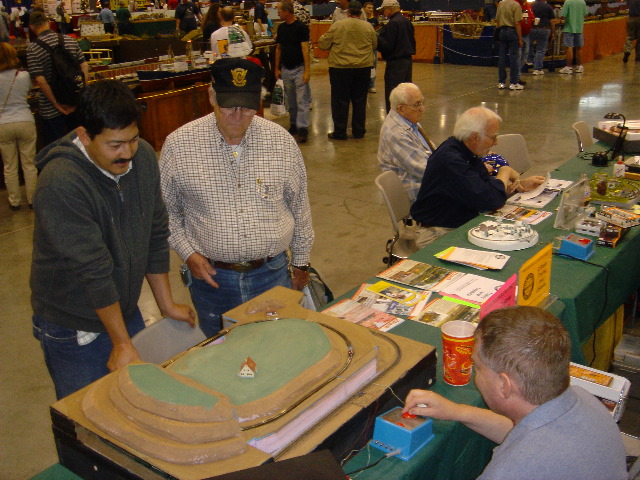
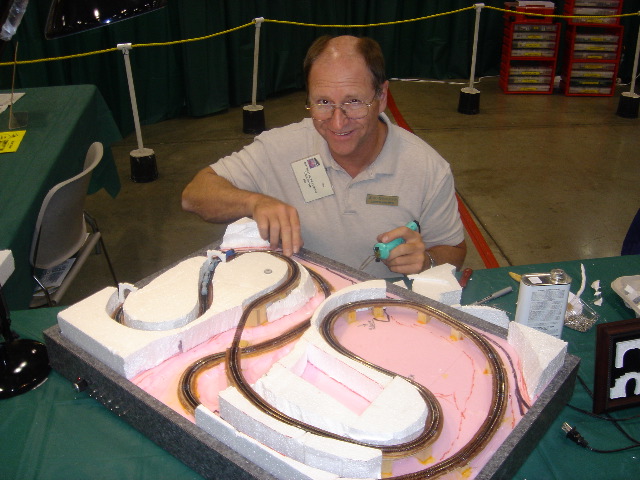
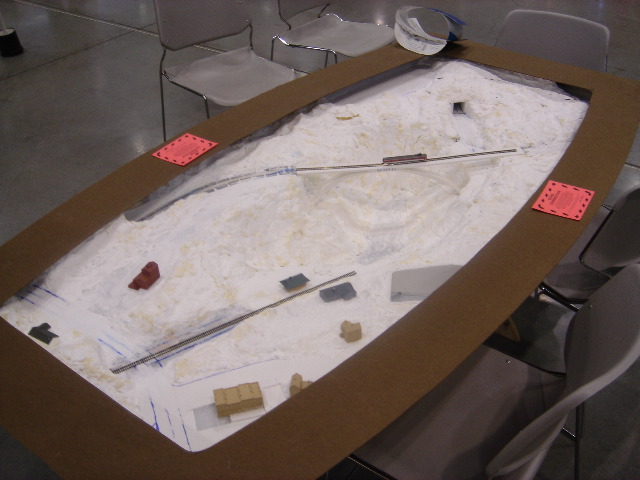

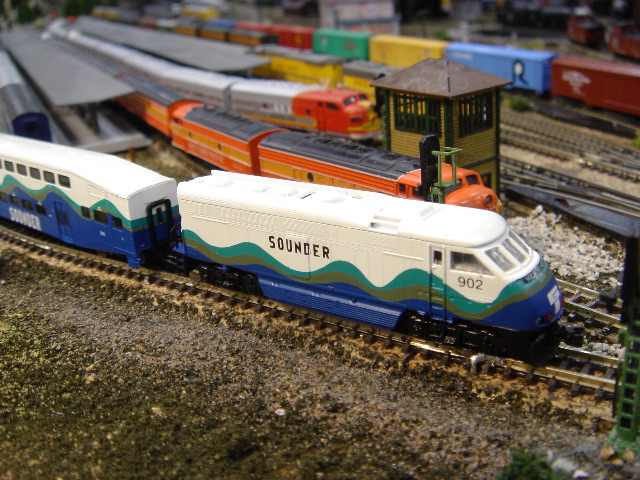
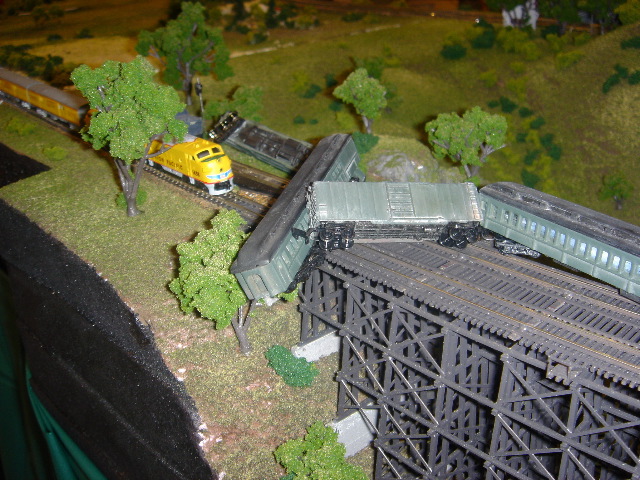

Z-BEND TRACK MODULES
We arrived at the convention center on Thursday afternoon with about 36
feet of Z-Bend Track modules. Even at that late date, we didn't know exactly
what our space would look like or what shape our modular layout would take.
The Z-Bend Track module specs allow for a great deal of flexibility, so we
decided beforehand that we would add or remove our own modules to
accommodate whatever out-of-town modules arrived to join us. Unfortunately,
our out-of-town guest modules never made it to the show.
With our roomy new location, we could set up everything we brought. Some of
our modules are bent at angles ranging from 10 to 30 degrees, so the overall
layout formed a wide crescent shape. On Friday morning, we added a short,
non-standard brachline module connected to a single-ended backshop module,
changing the crescent to a very tall "E" shape. As always, wiring,
troubleshooting, and skirting took us right up to doors-open time, but once
our trains were underway the layout performed reliably throughout the show.
The modular layout was kept in operation through the weekend by John
Barrett, Tom Gilchrist, Jim Glass, and myself.
Shows provide us a place to experiment with new ideas, and as usual our
modules sported all sorts of brand new features. Buildings were newly
illuminated from outside by street lamps and from within by welders, furnace
fires, and more. A couple of modules that we had displayed half-completed at
our last show now bore trees, grass, buildings, and traffic. Two modules had
new block-power control panels, and three modules had working signals.
Tom Gilchrist redesigned one of our oldest modules, taking a clever approach
to give old trackage a new look. He mounted HO-scale backdrops on a stiff
foam board and split the module into a large urban yard scene on one side
and a small forest vignette on the other side. On the forest side, trains
appear from and disappear back into the backdrop in a self-contained scene
about the size of a window-planter box. On the broader city side, building
flats and a road-to-nowhere freeway overpass blend the rail yard and
roundhouse into the urban backdrop.
Tonnage-wise, we ran shorter trains than usual. But we made up for the
shorter consists by frequently running three or four trains simultaneously
on our double-track mainline. The new power blocks we've added on two
modules allowed us to hold trains at red signals to keep traffic evenly
spaced apart. A two-module-long passing siding on one track also let hotshot
freights overtake slow drags. Still, it's quite a juggling act to keep four
trains running while talking with the public and we had some spectacular
rear-end collisions from time to time, generally at those moments when a
particularly large group of spectators happened to be nearby! Well, I did
mention that we like to experiment....
We had the honor of granting track rights to some amazing new Z-scale
creations. Hans Riddervold demonstrated AZL's new EMD F59PH locomotive and
Bombardier cars on our modules for much of the weekend. Painted in the
unmistakeable Sounder design, the train was a big hit with passersby, many
of whom had just seen the real Sounder at the King Street Station just yards
from the convention center. Harald Freudenreich had us give some serious
track testing to two prototypes of FR's new F40 locomotive, both of them
lettered in the Caltrain scheme. Robert Ray arrived with some beautifully
detailed center-beam flatcars and bulkhead flatcars made of laser-cut wood,
along with cast-resin covered hoppers and a pair of laser-cut cabooses.
These looked wonderful displayed in the yard on the backshop module, and
even better in consists on the mainline behind AZL diesels.
In the structure department, we worked some demonstration copies of new
cast-resin products into our scenery. These included Nansen Street's sharply
cast office-block flats, and a variety of containers, industrial tanks, and
modular buildings manufactured by SeaRails.
THEY'RE ONLY ENCOURAGING OUR BEHAVIOR
One of the weekend's biggest surprises came our way on Saturday morning, when the NTS awarded us third prize in the group module competition. The quality of work on layouts of all scales was very high throughout the show, so it was a big honor for our own workmanship to be placed so high by comparison. Jim Glass deserves special mention here, as he provided the judges with detailed descriptions of our work to help illustrate the amount of scratchbuilding and kitbashing we'd done in our small scale. I like to tell Jim he won the essay contest! :-) Z scale layouts have won major awards in each of the last three National Train Shows, and it's great to be able to participate in continuing the tradition.
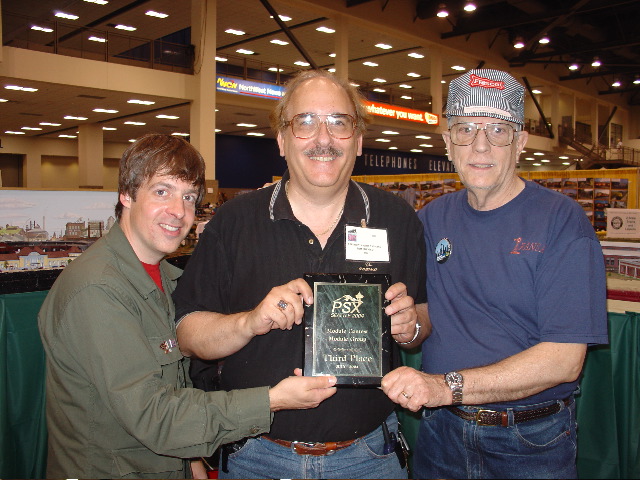
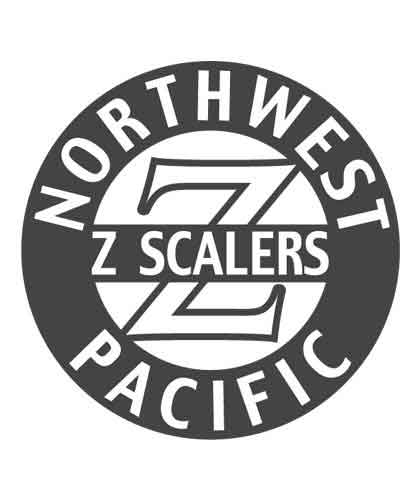
LOOKING AHEAD
With the National Train Show over and the Fall and Winter show seasons approaching (already!) we're taking time to decide what we want to do next. More products than ever are coming out in Z scale, providing us with even more inspiration. Look for some new club creations soon, especially compact module designs and small stand-alone layouts for our BYOZ exhibits. Be sure to take a look at ZTrack Magazine for more coverage of Z scale at the National Train Show. For more information about our club, feel free to e-mail us at one of these addresses:
Jim Glass -- berjimgl@msn.com Andy Hunting -- zscale@retrograde.net Tom Gilchrist -- tomg@tomgtomg.com-- Andy Hunting Northwest Pacific Z Scale, July 2004
